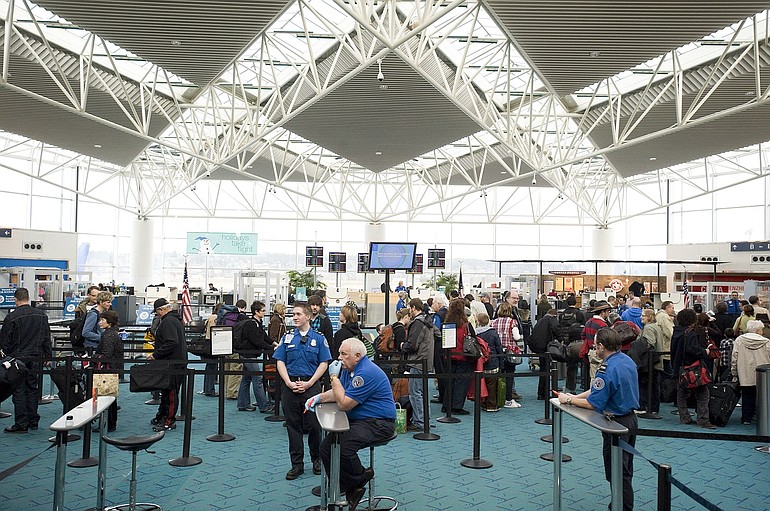PORTLAND — Except for the presence of Linda the bomb-sniffing dog, all appeared normal at Portland International Airport on Saturday, eight days after the attempted Christmas Day bombing of a flight from Amsterdam to Detroit triggered enhanced security at airports around the world.
But based on interviews with passengers arriving at PDX from other airports, both domestic and foreign, air travelers should expect changes, including more intrusive searches and delays.
At about noon Saturday, Kathi Drummond walked off a flight after a journey that began in southern Chile early Saturday, with transfers in Santiago and Atlanta. She’d been hiking in Patagonia with her sister, brother-in-law and young nephew over Christmas break and learned about the thwarted terrorist attack shortly before their flight home to Portland.
She was wanded, she said, “and they searched everybody’s bags very carefully, multiple times. We thought we might miss our flight.”
Maureen Ferlitsch began her day in Philadelphia, where she underwent a pat-down search, then changed planes in Houston.
“I didn’t have a problem with it,” she said. “I can see how it might slow things down. But if people are intent on hurting other people, you do what you have to do.”
Joyce Tounsley of Houston flew to Portland to visit her son, Jeremy Running. “They were checking everyone’s carry-on very carefully,” she said. “They made sure the computers were out. It was a little slow, but I don’t care as long as we’re safe.”
Rick and Anne Uchida of Portland and their 5-year-old daughter, Caitlyn, were returning from visiting his parents in Tokyo on a Delta Airlines flight.
“It was a lot tighter security,” Anne Uchida said. Every passenger was subjected to a full-body pat-down at the gate, she said, with female passengers screened by female transit security workers. “It’s understandable, considering what happened.”
The pilot initially told passengers that screens showing the progress and location of the flight would be disabled, she said, but the service was later restored.
Brittany Cetti of Salem, Ore., related the story of a friend who flew home from London’s Heathrow Airport the day after Christmas: “At Heathrow, they really questioned people,” she said. “They wouldn’t let people take their personal blankets and pillows on board, and they couldn’t have anything on their laps the last hour of the flight.” Plus, the in-flight movie was canceled.
Her friend missed all his connections and arrived in Portland four hours late, she said. But that won’t deter her from flying, she added. “I love traveling. I do it for my job.”
Port of Portland Police Officer Mike Oestler was making the rounds of the airport with his bomb-sniffing dog, Linda, a Dutch shepherd trained at Texas’s Lackland Air Force Base. Oestler said the Transportation Security Administration asked for a more visible canine unit presence at the airport through the holiday weekend, given the Christmas incident on board Northwest Airlines Flight 253.
TSA regional spokesman Dwayne Baird said the agency has a “layered approach” to security that allows transit security officials to add or subtract measures as needed on a daily basis. Those measures may include gate screening, including pat-down searches; close observation of suspicious behavior; and explosives-detection canine teams.
Many security experts say pat-down searches are ineffective at detecting hidden explosives. Airports at international transit hubs — including Heathrow and other airports in the United Kingdom, and Amsterdam’s Schipol airport, from which 23-year-old Nigerian Umar Farouk Abdulmutallab departed on his one-way flight to Detroit — are preparing to install full-body scanners, X-ray devices that can “see” through clothing and even detect items hidden within the body.
In the United States, the high-tech machines are in use at a few airports. The TSA recently bought 150 and plans to buy 300 more.
Kathie Durbin: 360-735-4523 or kathie.durbin@columbian.com.



